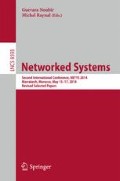Abstract
Vehicular Ad hoc Networks are considered recently as a fertile field of research. Their applications are showing a growing importance as they are expected to improve road safety and traffic efficiency, through the development of vehicle safety applications whose main goal is to provide the driver with assistance in dangerous situations. Thanks to vehicular communications, drivers can permanently receive information about road conditions which help them to make more reliable decisions. The idea behind this paper is to enable an adaptive assistance to drivers in different situations, based on their past driving experience. As a first step, we focus on the modeling and learning of individual driving behavior at a picoscopic level. This paper proposes a formal description of a driver-centric model, using the formalisms of hybrid IO automata and rectangular automata. Then, an online passive learning based approach for the construction of the described model is proposed. Having a model that describe the behavior of drivers can enable us to predict and recognize a driver preferences in different driving context, enabling thus an adaptive assistance.
Access this chapter
Tax calculation will be finalised at checkout
Purchases are for personal use only
References
Barbuti, R., Tesei, L.: Timed automata with urgent transitions. Acta Informatica 40(5), 317–347 (2004)
Boyraz, P., Sathyanarayana, A., Hansen, J.L., Jonsson, E.: Driver behavior modeling using hybrid dynamic systems for driver-aware active vehicle safety. In: Proceedings of the Enhanced Safety of Vehicles, pp. 1–8 (2009)
Choi, S., Kim, J., Kwak, D., Angkititrakul, P., Hansen, J.H.L.: Analysis and classification of driver behavior using in-vehicle can-bus information. In: Biennial Workshop on DSP for In-Vehicle and Mobile Systems, pp. 17–19 (2007)
Henzinger, T.A., Kopke, P.W.: Discrete-time control for rectangular hybrid automata. Theor. Comput. Sci. 221(1), 369–392 (1999)
Kumagai, T., Sakaguchi, Y., Okuwa, M., Akamatsu, M.: Prediction of driving behavior through probabilistic inference. In: Proceedings of the 8th International Conference Engineering Applications of Neural Networks, pp. 117–123 (2003)
Lynch, N., Segala, R., Vaandrager, F.: Hybrid i/o automata. Inf. Comput. 185(1), 105–157 (2003)
McCall, J.C., Trivedi, M.M.: Driver behavior and situation aware brake assistance for intelligent vehicles. Proc. IEEE 95(2), 374–387 (2007)
Miyajima, C., Nishiwaki, Y., Ozawa, K., Wakita, T., Itou, K., Takeda, K., Itakura, F.: Driver modeling based on driving behavior and its evaluation in driver identification. Proc. IEEE 95(2), 427–437 (2007)
Narendra, K.S., Thathachar, A.L.M.: Learning Automata: An Introduction. Courier Dover Publications, New York (2012)
Ni, D.: Picoscopic Modeling. Lecture Notes in Traffic Flow Theory (2013)
Nobuyuki, K., Tomohiro, Y., Osamu, S., Andrew, L.: A driver behavior recognition method based on a driver model framework. SAE Trans. 109(6), 469–476 (2000)
Oliver, N., Pentland, A.P.: Driver behavior recognition and prediction in a smartcar. In: AeroSense 2000, pp. 280–290. International Society for Optics and Photonics (2000)
Pietquin, O., Tango, F., et al.: A reinforcement learning approach to optimize the longitudinal behavior of a partial autonomous driving assistance system. In: ECAI, pp. 987–992 (2012)
Rosenfeld, A., Zevi, B., Goldman, C.V., Kraus, S., LeBlanc, D.J., Tsimhoni, O.: Learning driver’s behavior to improve the acceptance of adaptive cruise control. In: IAAI (2012)
Sakaguchi, Y., Okuwa, M., Takiguchi, K., Akamatsu, M.: Measuring and modeling of driver for detecting unusual behavior for driving assistance. In: Proceedings of 18th International Technical Conference on the Enhanced Safety of Vehicles (2003)
Sathyanarayana, A., Boyraz, P., Hansen, J.H.L.: Driver behavior analysis and route recognition by hidden markov models. In: IEEE International Conference on Vehicular Electronics and Safety, ICVES 2008, pp. 276–281. IEEE (2008)
Schwarze, A., Buntins, M., Schicke-Uffmann, J., Goltz, U., Eggert, F.: Modelling driving behaviour using hybrid automata. IET Intell. Transport Syst. 7(2), 251–256 (2013)
Author information
Authors and Affiliations
Corresponding author
Editor information
Editors and Affiliations
Rights and permissions
Copyright information
© 2014 Springer International Publishing Switzerland
About this paper
Cite this paper
Bouhoute, A., Berrada, I., El Kamili, M. (2014). A Formal Driving Behavior Model for Intelligent Transportation Systems. In: Noubir, G., Raynal, M. (eds) Networked Systems. NETYS 2014. Lecture Notes in Computer Science(), vol 8593. Springer, Cham. https://doi.org/10.1007/978-3-319-09581-3_21
Download citation
DOI: https://doi.org/10.1007/978-3-319-09581-3_21
Published:
Publisher Name: Springer, Cham
Print ISBN: 978-3-319-09580-6
Online ISBN: 978-3-319-09581-3
eBook Packages: Computer ScienceComputer Science (R0)

